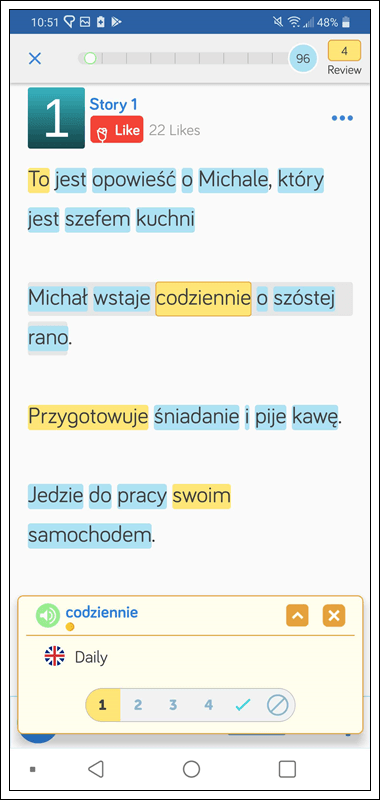An Introduction to Polish Slang Vocabulary
After learning the Polish alphabet, the first words that learners come in contact with usually are kiełbasa (sausage), pierogi (dumplings), or cześć (hi) if you actually know someone from Poland. Needless to say, these are not the words defining daily communication in Poland.
I know where you think this article may be going…but no, I am not covering Polish swear words – even though from my experience these are amongst the first things that foreigners are eager to learn.
As important as it is to learn about a country’s pleasantries, formal greetings and other respectful forms of communication – slang is as prevalent in Polish as in any other language. Knowing the most popular terms can make your trip or life in Poland easier and most likely more fun.
While there are some Polish slang words that have pretty obvious meanings, others do not have direct translations. I will tackle these anyway, as well as cover the ones with interesting origins and hopefully you will find some of these as entertaining and useful as I do. After you’ve gone through the article, be sure to check out this post about cool Polish words to really make an impression 😉

Polish slang vocabulary in context
Starting with spoko which is basically the polish for “okay”. You might ask someone how they are doing and they may respond with “spoko”. It means they are fine. If you ask someone to do something, like help you make pierogi, they may give you the same “spoko” response as well, which means “no problem”. It comes from the word spokojnie which means “relaxed” or “keep calm”. The slang version of it just drops the second half of the word, resulting in spoko. Wporzo is a similar slang word for “okay” which comes from the word w porzadku which literally translates to “in order” or “alright”.
Another slang word that comes to life after being chopped in half is nara, which stems from narazie (bye for now). It is used by poles as a casual way to say goodbye – similarly to “see ya”.
But not all Polish slang words are so straightforward. No for example means “yes” in polish slang. To avoid any confusion, the formal and standard way of saying “yes” in Poland is tak and nie means “no”. However, if you are hanging out with your friends and one of them suggests going to a party, saying no can lead you to a fun time with your friends instead of home like you may have originally planned.
What can you expect to find at a Polish party? A browar for sure, formally known as piwo or “beer”. Browar is a slang word that means “brewery” – except when a ziomek or a buddy asks you to go for a browar they are just offering a beer, not a trip to an actual brewery. Ziomek is a slang term that is similar to “homeboy” in English, it is often used in hip-hop but has a wholesome origin. It is a term used for someone from your region, your area or neighborhood and stems from the word ziemia which means earth.
If you party too hard, you might end up w pudle which directly translates to “in a box” but really means “in jail” in Poland. Alternatively, you might decide to forgo the party or browar and instead spend your evening in your house or apartment. In that case, you can say that you are “on a square” or na kwadracie which in Polish slang simply means you are home.
A slang term I like is spływaj – it is a light way of saying “leave me alone” but it literally means “float away” which I think is quite endearing.
But wait, there’s more
Musztarda po obiedzie – mustard after dinner, which is something Poles say after a missed opportunity or when they regret something they cannot do anything about.
Płyta się zacięła – the record got stuck, which you can say about your friend if he keeps talking about the same subject over and over.
Tapeta – the standard meaning is wallpaper but in Polish slang it is used to describe a huge amount of makeup on someone’s face. Eg. “Wow, look at her wallpaper”.
Pasztet – or pâté has two meanings. It is a term used for the meat paste or for someone who is not considered attractive.
Kapusta – cabbage means money in Polish slang.
Banan – another great word with several meanings depending on the context. If someone says “podaj banana” or “pass the banana” it is safe to assume they are referring to the fruit. If someone says “he’s got a banana on his face” they simply mean that a person has a big smile on their face. Lastly, if someone calls you a banana, they think you consider yourself well-off or rich. Another word for a rich person? Stuffed or nadziany which is the same word used to describe a donut.
Last but not least, a popular slang word in Polish is suchar which can be directly translated into dry bread, otherwise known as a dad joke or a dry joke.
Boost your Polish reading and listening skills
You’re going to need more than just Polish slang to be able to communicate, especially when you meet someone for the first time or have to work in a Polish office.
A good way to kick-start your Polish skills is to read and listen to native content that isn’t too difficult. Rinse and repeat for about an hour a day and you’ll be surprised at how much you can learn within a year.
LingQ is a great place to find thousands of hours of Polish content, including easy-to-follow lessons such as Mini Stories, Polish news, podcasts, and much more. Also, you can import your own content into LingQ and create interactive lessons to help you study easier.

You can keep all your Polish content in LingQ for quick and easy access. LingQ offers dictionary resources that allow you to look up new words with a single tap and the ability to review those words using SRS. 🙂
So what are you waiting for, learn Polish using LingQ. It’s free to try and you get to choose which content you want to learn from. Good luck!
